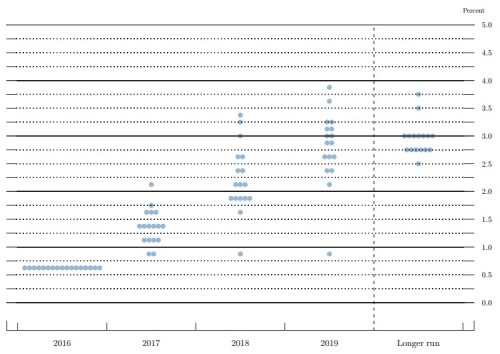The Federal Reserve hiked its benchmark interest rate for only the second time since the financial crisis on Wednesday, in line with our and indeed the overwhelming market consensus.
Crucially, the Fed also bumped up its expectations for interest rate hikes next year. The FOMC’s ‘dot plot’ showed that members now expect on average three rate hikes in 2017, compared to just two previously anticipated before Donald Trump’s election victory. Overall 11 of the 17 members thought that the Fed would hike on three occasions next year, quite a bit more hawkish than the market had anticipated (Figure 1).
Figure 1: FOMC December ‘Dot Plot’
Chair Janet Yellen’s press conference remained fairly cautious, downplaying the change in the projected path of future rates as only a modest shift in the thinking of several committee members. She did, however, acknowledge the “considerable” progress the US has made, indicating an improvement in the labour market and inflation.
The Fed also moderately revised upwards its growth forecasts 0.1% for 2017. The Dollar rallied hard off the back of the announcement. The US Dollar index soared to its strongest position in 14 years, the Japanese Yen was down 2% to its lowest level in 10 months, while the Euro plunged to its weakest position since March 2015 (Figure 2).
Figure 2: EUR/USD & GBP/USD (14/12/2016 – 15/12/2016), Last night’s announcement reinforces our opinion that gradually increasing interest rates in the US will lead to a continued appreciation of the Dollar, and expect it to reach parity with the Euro at some point in the first quarter of 2017.
Currency markets will now quickly turn their attention to this afternoon’s Bank of England monetary policy meeting. We expect a fairly low key meeting by recent standards. We don’t believe the economic data released in the UK in the past few weeks has been supportive of any change in stance from the BoE, and expect essentially a repetition of the November message.
The BoE will be releasing its interest rate decision today, along with the meeting minutes.
Major currencies in detail
GBP
Sterling fell in line with every major currency against the Dollar yesterday, ending 1% lower.
Yesterday’s labour report in the UK was, on the whole, fairly encouraging. The headline unemployment rate remained unchanged in the three months to October at 4.8%, despite rising by 12,000 in real terms for only the third time this year. By contrast, wages continue to rise far above the level of inflation. Average earnings excluding bonuses increased to a one year high 2.6% from 2.5%, while including bonuses also surprised to the upside, rising to 2.6%.
The relatively solid labour report adds to the string of fairly strong economic data out of the UK of late, further reinforcing the likelihood that the Bank of England will keep its policy steady in the near term.
EUR
The Euro plunged by 1.4% to its weakest position in nearly two years after last night’s Fed meeting.
Wednesday’s industrial production report in the Eurozone made for fairly grim reading. Production in the industrial sector edged down 0.1% in October, below consensus. The decline was largely driven by a weak report in France, with activity in most other countries also remained subdued. Manufacturing production also dropped for the second month in a row, although the forward looking components of the index suggest that weakness in the data may prove short lived.
The preliminary manufacturing and services PMI’s out of the Eurozone this morning are expected to remain mostly unchanged for November.
USD
The US Dollar index soared to a fresh 14 year high, increasing 1.5% yesterday evening.
Prior to yesterday evening’s Fed meeting retail sales came in slightly below expectations. Sales increased by a meagre 0.1% in November, with the core measure increasing by an equally unimpressive 0.2% on a month previous. Moreover, the October figure was revised downwards to 0.6% from 0.8%, making for a fairly disappointing report overall. Momentum for overall growth in the fourth quarter remains robust, although is now unlikely to exceed 2% annualised.
US inflation data at this afternoon will be the main focal point in trading across the pond today. Inflation is forecast to have edged upwards to 1.7% in November.
